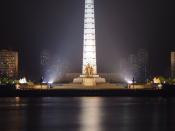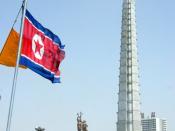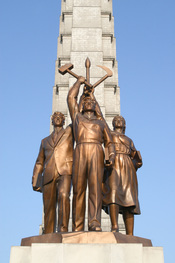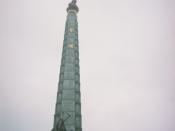He was born on April 15, 1912, at Mangyongdae, Pyongyang, to a poor peasant family.
His family, a most patriotic and revolutionary one, was in the forefront of the people's fight for many generations, from the beginning of the modern revolutionary movement of the Korean people for the independence of the country, the freedom and liberation of the people and for the victory of the noble revolutionary cause of the working class.
He grew up, receiving his revolutionary education at home and acquiring a revolutionary outlook on the world through study and revolutionary practice; he became a prominent revolutionary.
He pioneered the path of the revolution independently by applying Marxism-Leninism creatively to the Korean situation and, in its course, evolved the Juche idea, a new revolutionary ideology.
The Juche idea has become the unshakeable guiding ideology of the Korean revolution.
He organized the Down-with-Imperialism Union (DIU), on October 17, 1926, a vanguard union that led the revolutionary cause of Juche to victory; it became a genuine communist revolutionary organization.
The programme of the union was to achieve the liberation and independence of the country and to build socialism and communism in Korea and to fight for the victory of communism throughout the world.
During his Yuwen Middle School days in Jilin from 1927 to 1929, he rallied young students around revolutionary organizations, educated and trained them through struggles against the Japanese imperialists and reactionary warlords.
He organized the Young Communist League of Korea on August 28, 1927.
While serving a prison term in Jilin, from the autumn of 1929 to the spring of 1930, he elaborated the line and policies of the Korean revolution, including the line of armed struggle.
At a meeting of cadres of the Young Communist League and the Anti-Imperialist Youth League at Kalun, Changchun County, China, held in June 1930, he gave a scientific definition of the character, basic tasks, motive forces and targets of the Korean revolution, and advanced the line of the anti-Japanese national-liberation revolution, a line which consisted of the policies for armed struggle, for the anti-Japanese national united front and for the founding of the party.
On July 3, 1930, he formed the first Party organization at Kalun with young communists of the new generation whom he had trained, the first organization to be the glorious origin of the Workers' Party of Korea and the prototype of the Party organizations which were formed later.
He organized the Korean Revolutionary Army in July 1930. The Korean Revolutionary Army was the first armed organization of the Korean communists, a political and paramilitary organization to prepare the anti-Japanese armed struggle.
On April 25, 1932, he founded the Korean People's Revolutionary Army, the first standing revolutionary armed force of the Korean people, and became its commander; in May 1934 he formed and guided the Party Committee of the KPRA which gave unified leadership to the Party organizations in both the KPRA and local areas.
On May 5, 1936, he founded the Association for the Restoration of the Fatherland, an anti-Japanese national united front organization, and was acclaimed chairman of the association.
He led the anti-Japanese revolutionary struggle centring on armed struggle to victory, and achieved national liberation on August 15, 1945.
During the anti-Japanese revolutionary struggle he trained a strong revolutionary force, for the further development of the Korean revolution, laid the organizational and ideological foundations for the establishment of a revolutionary party of the Juche type and created the glorious revolutionary traditions of the Korean people.
After liberation, he promoted a line for the building of a democratic new Korea and gave wise leadership to the struggle to build a party, state and army and to carry out the anti-imperialist, anti-feudal democratic revolution.




